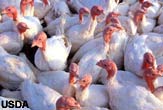Safe Turkey Tips Amid Bird Flu Fears

Get the world’s most fascinating discoveries delivered straight to your inbox.
You are now subscribed
Your newsletter sign-up was successful
Want to add more newsletters?

Delivered Daily
Daily Newsletter
Sign up for the latest discoveries, groundbreaking research and fascinating breakthroughs that impact you and the wider world direct to your inbox.

Once a week
Life's Little Mysteries
Feed your curiosity with an exclusive mystery every week, solved with science and delivered direct to your inbox before it's seen anywhere else.

Once a week
How It Works
Sign up to our free science & technology newsletter for your weekly fix of fascinating articles, quick quizzes, amazing images, and more

Delivered daily
Space.com Newsletter
Breaking space news, the latest updates on rocket launches, skywatching events and more!

Once a month
Watch This Space
Sign up to our monthly entertainment newsletter to keep up with all our coverage of the latest sci-fi and space movies, tv shows, games and books.

Once a week
Night Sky This Week
Discover this week's must-see night sky events, moon phases, and stunning astrophotos. Sign up for our skywatching newsletter and explore the universe with us!
Join the club
Get full access to premium articles, exclusive features and a growing list of member rewards.
As Americans sit down to a turkey dinner Thursday, there is yet another thing to be thankful for: turkeys.
With a powerful avian flu spreading around the globe, chickens and ducks destined for dinner tables in several countries are being destroyed. China alone has killed more than 10 million birds in a so-far unsuccessful effort to control the spread of the virus.
The bird flu has killed at least 67 people in Asia, but for now it does not spread between humans and has not entered the United States.
Can you be sure that your Thanksgiving turkey is safe? Yes, officials say, but as always you need to cook it right.
"While avian flu has been observed in people and birds on other continents, it isn't something for Americans to get overly concerned about now," says Mike Hulet, associate professor of poultry science at Penn State. " Avian flu hasn't even entered this country, but even if it had, as long as a turkey is properly cooked, there is nothing to worry about. That goes for all bacteria and viruses."
Virus-free for now
To date, there have been no cases of the current avian flu strain (called H5N1) detected in birds in the United States. Nor have any other avian flu strains that could potentially morph into a human variety been found this year. No poultry from countries with confirmed cases of the highly infectious strains can be imported into the United States.
Get the world’s most fascinating discoveries delivered straight to your inbox.
Were one to somehow slip past the monitoring system and into your kitchen, there is still little to worry about. The avian flu virus can't be passed to humans who eat properly cooked poultry, according to the USDA.
The few dozen human deaths in Asia from bird flu in recent months were caused by improper handling of infected birds or equipment, scientists say.
Be clean
Proper handling and cooking of poultry provides protection against this virus, as it does against many viruses and bacteria, including Salmonella and E.coli. A good-quality food thermometer is an important tool for anyone who cooks poultry, experts say.
Here are the USDA recommendations:
- Wash hands before and after handling food.
- Keeping raw meat, poultry, fish, and their juices away from other food.
- After cutting raw meats, wash hands, cutting board, knife, and counter tops with hot, soapy water.
- Sanitize cutting boards by using a solution of 1 teaspoon chlorine bleach in 1 quart of water.
- Use a food thermometer to ensure food has reached the proper temperature. Cook whole birds to 180° Fahrenheit; breasts to 170°; drumsticks, thighs and wings to 180°; and a minimum oven temperature of 325°.
What about next year?
Savor this year's turkey. Because there is no guarantee that next year, when the avian flu could reach the United States, will be so simple.
Other strains of bird flu have forced destruction of U.S. poultry in the past. The three most significant events:
1924: Contained to East Coast live bird markets.
1983-84: About 17 million chickens, turkeys, and guinea fowl in the northeastern United States were destroyed.
2004: Outbreak in chickens in the southern United States was quickly eradicated and limited to one flock.
- SPECIAL REPORT: Flu Fears
- U.S. Not Prepared for Flu Pandemic
- Bird Flu Pandemic Imminent, Health Official Says
- Avian Flu Could Reach U.S. Next Year
- Trojan Ducks: One More Possible Flu Carrier
- Scientists Recreate 1918 Flu Virus From Scratch
- Huge New Virus Defies Classification
- Americans' Dirty Secret Revealed
SPECIAL REPORT
With concern of a global pandemic running high, LiveScience explains flu basics, how to avoid and treat the flu, and how it could become a global killer.
Robert is an independent health and science journalist and writer based in Phoenix, Arizona. He is a former editor-in-chief of Live Science with over 20 years of experience as a reporter and editor. He has worked on websites such as Space.com and Tom's Guide, and is a contributor on Medium, covering how we age and how to optimize the mind and body through time. He has a journalism degree from Humboldt State University in California.
 Live Science Plus
Live Science Plus











